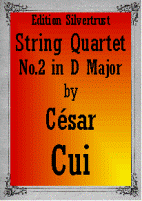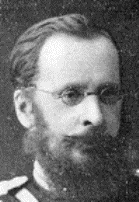Presents
César Cui
 |
 |
Soundbites courtesy of Steve Jones |
String Quartet No.2 in D Major, Op.68
"Cui’s String Quartet No.2 in D Major appeared in 1907. The first movement begins with an Andantino introduction leading to the main section Allegro non troppo. The music is immediately appealing and full of charm. The next movement, Vivace non troppo, is a highly effective, fiery Scherzo the rhythms to which are particularly interesting. The middle section provides a lyrical contrast. The third movement, Andante, is characterized by its modulations and changing tonalities. The main subject of the finale, Allegro non troppo, appears to be based on Russian folk music and is presented in a rondo format. The second subject is warm and ingratiating.”---the famous chamber music critic Wilhelm Altmann, writing in his Handbook for String Quartet Players.
César Cui (1835-1918) was born in the then Russian (now Lithuanian) city of Vilnius also known as Vilna. His father was French, his mother Lithuanian. When he was 16, his parents sent him to St. Petersburg to take a degree in engineering. Subsequently, he began a career as a military engineer and eventually became an expert on military fortifications. His expertise was such that he ended his career as a general and for many years was a professor of this subject, writing several important works. Nonetheless, Cui today is only known as a composer. As a boy, he was given piano lessons and studied with the then prominent Polish composer Stanislaw Moniuszko before leaving for St. Petersburg. Like his better known contemporary, Alexander Borodin who was a chemist, Cui despite pursuing an active military and academic career, nonetheless, composed throughout his life and was actually a rather prolific composer. In addition to this, he was a prominent music critic. As a critic his goal was to promote the music of contemporary Russian composers, especially the works of the composers who eventually became known as The Mighty Five. (Rimsky Korsakov, Borodin, Cui, Balakiev and Mussorgsky) Cui concentrated his efforts on opera and vocal works and did not write symphonies, although he did write a few orchestral works. He did not ignore chamber music, writing three string quartets. Outside Russia, his reputation rests almost entirely on a short, evocative work he wrote for violin and piano, Orientale.
This is a another fine work from the Russian Romantic period. Long out of print, we are very pleased to recommend it to professionals and amateurs alike.
Parts: $24.95
Parts & Score: $33.95